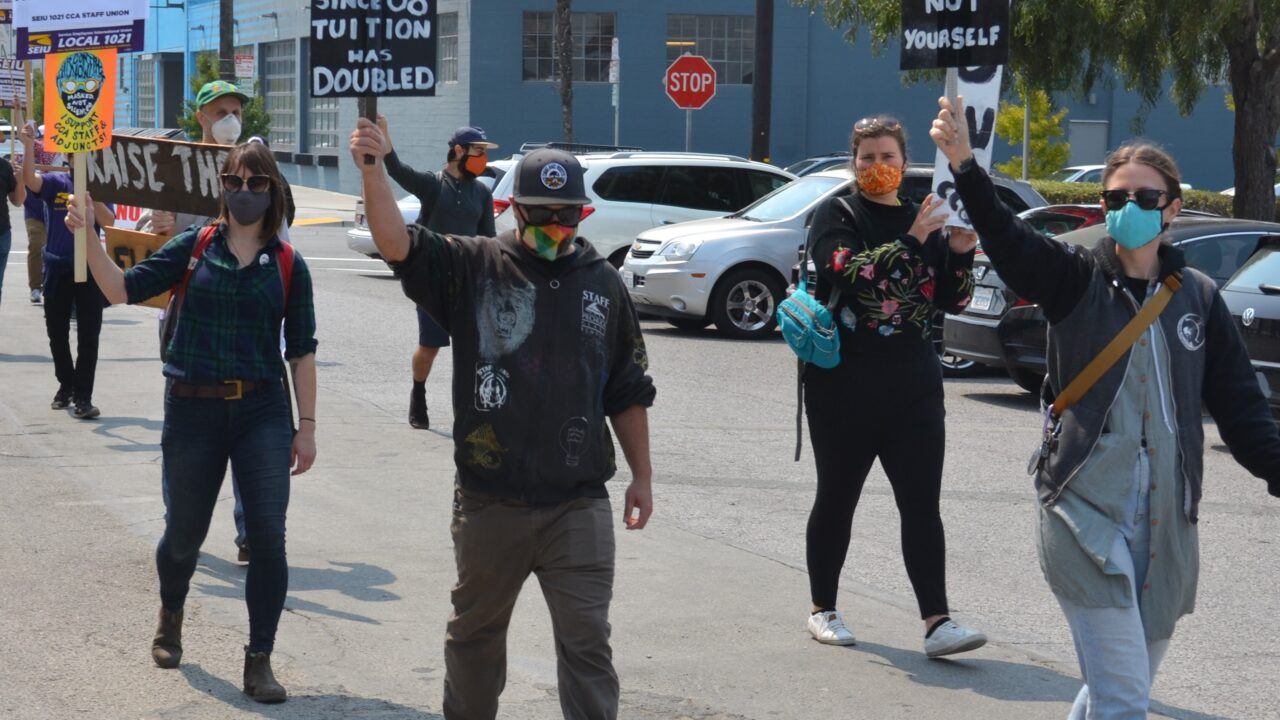In the midst of a global pandemic and related economic and social upheaval, employers will predictably try to exploit the crisis and put the shock doctrine to work — seeking concessions from labor and pushing their neoliberal agenda. Higher education is no different. At colleges where SEIU 1021 represents staff and professors, employers have offered a common refrain: we’re in unprecedented times; we’re all feeling the pain; let’s come together and keep the institution afloat.
COVID-19 has sapped revenue and enrollment from universities and colleges across the country. Small, independent, non-elite colleges that were unstable before COVID-19 are at greater risk now. At the same time, we’ve discovered that the crises schools presently face are caused as much by the predatory role of real estate finance in higher education as by the unexpected public health crisis. Universities were already in distress because Boards of Trustees and administrators agreed to dangerous loans over the last decade. As they call for unity, these administrators lay off their lowest paid workers and evade responsibility for a crisis that they, in no small part, created.
SEIU 1021 has been working with Bargaining for the Common Good to support union members at colleges and universities to research their institutions’ debt. Institutional debt is the means by which universities extract wealth from workers and students to generate profits for developers and banks — all while claiming the mantle of social justice and enjoying tax-exempt status. Colleges and universities are real estate. This contradiction provides a framework for workers and students to build power that can resist concessions; organize more people into the labor movement; and push for policy changes that weaken the grip of institutional finance over our education system.
In the Bay Area, the current crisis in private colleges started in the years after the mortgage-backed securities crisis of 2008. During those years, tuition-dependent colleges saw enrollments — and revenues — increase. The education economy is countercyclical; it grows when the economy as a whole contracts. During those years, schools bet on the notion that enrollment increases would continue and turned to debt markets to fund institutional growth — by either taking out new debt or refinancing existing debt. By 2018, four of the seven schools that employ SEIU Local 1021 members had accumulated debt amounting to more than 50 percent of their endowments: San Francisco Art Institute (SFAI) (55 percent), St. Mary’s College of California (71 percent), California College of the Arts (CCA) (110 percent), and Dominican University (78 percent).
Colleges financed and refinanced debt by leveraging significant portions of their property in one of the hottest real estate markets in the country. SFAI, for example, used its historic Russian Hill campus as well as its collection of Works Progress Administration murals as collateral for a loan. The school is presently in foreclosure. CCA leveraged an entire city block in San Francisco — the site of its main academic buildings — which it could lose if it fails to meet enrollment minimums required by its loan from First Republic Bank. Mills College and Notre Dame de Namur also leveraged property for loans with First Republic Bank. Meanwhile, St. Mary’s College holds $70,275,000 in interest rate swaps — a financial derivative where the creditor and debtor “swap” interest payments based on fluctuations in market interest rates. In 2017 and 2018, St. Mary’s suffered losses totaling over $25 million due to this form of debt, a figure that itself is equal to 14 percent of the school’s endowment.
As the economy stabilized from 2012-2017, revenues at the colleges where SEIU Local 1021 represents workers decreased on average by 1.4 percent. The concurrent growth in debt and drop in revenue has created pressure in these schools to meet debt payments and comply with debt covenants over providing good jobs and high-quality education. This pressure directly results from college boards and administrations who agreed to revenue minimums or enrollment floors as part of their loan packages — usually ranging between 1.2 and 1.5 times debt service. If enrollment or revenues drop, colleges have to either raise tuition and/or cut services and labor standards to comply with their lender’s conditions. From the perspective of the bank speculators making the loans, there is no downside. Either they get paid back for a loan on highly lucrative terms or they get to claim the valuable land used as collateral; they may also get the resulting student debt payments for years to come. If the consequence is debt-burdened students and declining educational and labor standards, it’s not their problem.
The research done by coalition partners has shown that, around the country, both public and private institutions shift the debt burden directly onto students. At the University of Kentucky, the school pledges over $110 million in athletics revenue for debt service on at least one of its bonds. Put differently, University of Kentucky pays back debt from the unpaid labor of a group of student workers that is over 60 percent Black. Since 2007, debt servicing payments in the University of Wisconsin system have increased by 63 percent; tuition since 2009 has jumped — almost identically — by 56 percent. At CCA, the school requires students to live on campus so that room-and-board charges can pay back the nearly $100 million in debt held by a developer to build new dorms in San Francisco. When the dorms were announced, the College lauded itself for making a deal “with no [financial] recourse to the college.” That’s correct: the recourse is to the students.
In the worst cases, debt can result in the collapse of an institution altogether. SFAI, the country’s oldest fine arts college west of the Mississippi, is being foreclosed on. And while the school insisted as recently as July that their collapse is a symptom of COVID-19, what precipitated the collapse was a series of shockingly irresponsible decisions by its board of trustees. Namely, after falling short in its public promise to fund a campus expansion exclusively with donations, SFAI’s Board leveraged all assets of the institution to secure a high-interest loan for a risky expansion project at Fort Mason that assumed ambitious enrollment growth that never appeared.
Notre Dame de Namur — California’s first college to confer degrees to women — recently received a $10 million bailout from the Sisters of Notre Dame, the Catholic order that owns the school. Like SFAI, NDNU had also failed to live up to capital campaign promises. On top of that, the former CFO of NDNU gave himself a 62 percent raise between 2013-2017 while the school was laying off faculty, operating in the red, burning up the small endowment to cover operating expenses, and hemorrhaging enrollment. NDNU also leveraged its entire property in a loan from First Republic Bank. The University is currently searching for parties to buy its campus because it may run out of cash before the school year is over.
While banks are to blame for creating loan-to-own scenarios at NDNU and SFAI, the Boards of Trustees at these universities — made up successful and wealthy businesspeople — knew, or should have known, that they were gambling away their schools for questionable expansion plans. Board members often had other financial ties to the entities creating the debt. The parties who suffer the most are the workers who have been laid off and the students who invested years into degrees that won’t materialize.
We’ve used our research into university debts to build membership engagement, both within our union and with coalition partners, including student groups. Unionized staff at CCA, for example, held a rally outside of the school’s new dorms on move-in day where they drew connections between the school’s current layoffs, administrative salaries, student housing costs, and debt service. In addition, SEIU 1021 is pushing for contract language that demands more transparency from schools that make financial decisions behind a cloak of secrecy.
We’ve been working with Bargaining for the Common Good on a series of trainings on how to research institutional debt in higher education so that unions can more effectively challenge the financialization of higher education and its devastating impacts on workers and students — and do so before their colleges have begun an irreversible death spiral. We do that by forming unions and demanding worker voice at these institutions; by building coalitions with student and community groups to increase our power; and by pushing for debt-free financing for higher education.
Training Videos
For more resources on how to research college debt, you can contact the authors at Lisa.Cody@seiu1021.org and Corey.Sherman@seiu1021.org.

